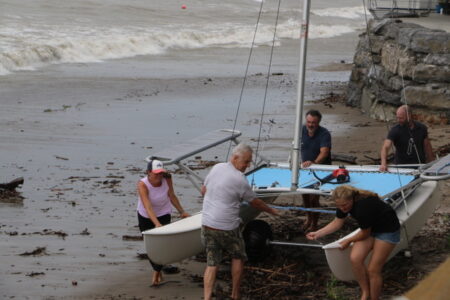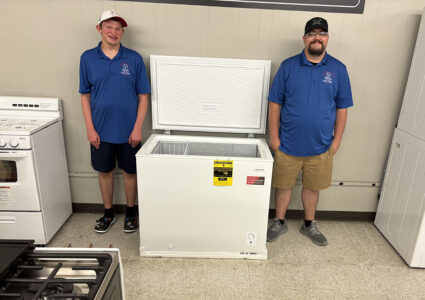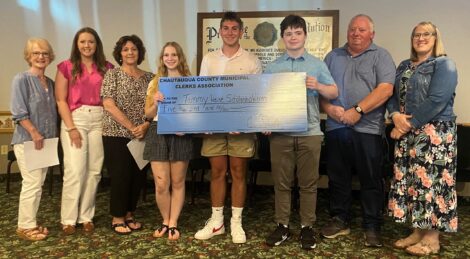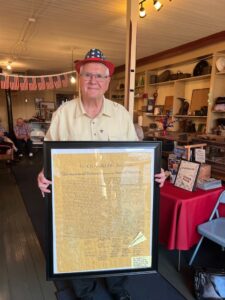Saluting Ross Conti, U.S. Navy Seabee World War II

• Served — Navy Seabee, Petty Officer 2nd Class Motor MAC, World War II • U.S. Navy Reserve Chief Tender • Married: Feb. 16, 1949 to Geraldine (Privateer) at St. Anthony’s Parish in Fredonia. Ross lost Geraldine to cancer in 1974. • Married: Aug. 17, 1976 to Elaine Sandra (Peters) at the Fredonia Methodist Church. • Children — First marriage — Denise (Conti) Altman and Michelle (Conti) Raggi. Second marriage — Kelly Przybycien, Jennifer Boyda, Frank Przybycien Jr., wife Rachel • Grandchildren: Chris Groff, Brian Grogg, Andrea Altman, Gregg Raggi Jr., Sara Bates. • Step-grandchildren: Elizabeth Nowicki, Rebecca Clemmons, Katie Kwiej, Meghan Przybycien, Cory Przybycien , Nichole Boyda, Jessica Boyda, Ashlee Lewis, Alaina Przybycien. • Great-grandchildren: Madgan Groff, Hannah Groff, Kyilee Groff, Mason Groff, Noah Groff, Gia Raggi, Katarina Raggi, Alexandria Bates, Hunter Bates, Isabella Bates, Nick Bates, Carson Bates, Kasmier Clemmons, Elliot Kwiej. • TOAR — Tactical area of responsibility, the Pacific Theater • Medals and Awards: World War II Victory Medal, Pacific Theater, Asiatic Medal, Navy Unit Citation, Philippine Liberation Medal, Good Conduct, Navy Reserve Medal, World War II Navy Occupation Medal. • World War II Seabee — Duties: heavy equipment operator
Ross Conti was born on March 13, 1927, at his Laona farmhouse on Route 83. He is the son of Ross and Louise (Laduca) Conti.
As a child there were many things to do on this dairy and fruit farm. Every day Ross was out feeding the cows or horses and in the summer he was always lending a hand out in the field picking strawberries or whatever fruit was in season.
Conti attended the Laona School 1 located on Route 60. He recalled this school being a three class schoolhouse. One classroom held grades first and second; the next room grades three, four and five and the biggest room the sixth, seventh and eighth grades.
Conti went to Dunkirk School 10 for his high school years. Most called the school industrial high school. This school consisted of basic high school classes for the first half of the day and the last four hours were dedicated to a trade class consisting of either machine shop, wood shop, auto mechanics or electrical shop.
Conti, because he enjoyed working on the farm equipment, chose the machine shop. When school wasn’t in session he could be found with his friends Bob Emmont, (later Kia in Korea, U.S. Army), Bruce La Barron and Tug Tramudo hanging out in Fredonia park. He recalled they never really got in any serious trouble.
Conti recalled one thing for sure — he was always talking to and watching all the local Fredonia girls. He left school in November 1944 to enlist and do his part to help our country with his best friend Bud Zentz. In Buffalo, not knowing for sure if they wanted the Navy or Marines, Conti flipped a coin. Within the next hour he was in a U.S. Navy line signing a stack of papers. After his military obligation was complete, he did receive his high school diploma after attending night school classes.
Conti entered boot camp at Slapson naval boot camp in Slapson, N.Y. While in Naval boot camp the instructors kept telling these new recruits what an honor it would be to become a Navy Seabee. The only drawback would be the training that the Seabee sailors would have to complete before being assigned a Seabee billet. The instructors claimed the training would be almost equivalent to what the U.S. Marines were taking.
Conti before signing the papers to become a sailor actually had thoughts of becoming a U.S. Marine but the decision was made by a flip of a coin. Ross Conti from Fredonia was off to Camp Davisville, R.I., to start his Navy Seabee school.
As Conti had been warned, the training was tough. He often felt if he could pass this Seabee training, maybe he could have been a U.S. Marine. At Camp Davisville he was trained in small arms, the 45 pistol, the M1 rifle hand grenades and the machine guns used in the military at that time. After weapon training he was trained in military heavy equipment landings and maintenance.
With his Seabee training over, he was holding orders for action in the European Theater. But after a three-day wait new orders came and he was heading the other way, this time to California. His orders were to report to the commanding officer at Camp Shoemaker. Here the Navy was training its personnel for overseas readiness.
While at the Camp Shoemaker all naval personnel were given strict orders not to leave the base because they were all ordered to be sent overseas with their destination being the Philippines.
With orders for the Philippines he reported to the USS Knox, a troop carrier loaded with Army, Navy, and U.S. Marines. The 31-day sailing time went without incident except for the fact that one day the ship went to general quarters fearing an enemy submarine was following the USS Knox.
Conti did credit the crew of the USS Knox with disabling many mines that were floating freely in the Pacific. To this day he still recalls the loud bangs that came when the Navy demolition crews blew up the mines as the USS Knox passed.
Conti also recalls spending the nights hoping the Knox would not hit any mines then. On the morning of the 32nd day at sea the USS Knox made port on the island of Samar about 30 miles from Subic Bay. Before disembarking, he was given orders to report to Subic Bay to help in building the Navy’s A.B.C.D. (advanced base construction depot). This was to be the Navy’s largest supply depot in the Philippines. It would be used to support any and all Navy and U.S. Marine units needing supplies, mostly building equipment heavy duty vehicles, jeeps, uniforms, food and all kinds of artillery and small arms rounds.
While at Subic Bay he recalled working a seven-day week, resupplying equipment that was going to be used for the invasion of Japan. Most of the equipment was airstrip building equipment that was priority for building the many airstrips that were to be used by all our pilots for landings returning from combat related missions.
One morning with the summer of 1945 slowly coming to its end, he recalled hearing the ships at sea blowing their whistles and shooting off flares. Pilots were flying over doing barrel rolls U.S. Marines were firing their M1 rifles. With all this commotion he heard the words. He had prayed every day that he would hear the war was over.
Although World War II was over, it did not mean that Ross Conti was heading home. The older men with more time were sent home. Conti received his new orders. He was to stay and keep track of all the military equipment we had brought over to the Philippines. He would oversee this equipment until April 1946 when the U.S. Navy decided to give this equipment over to the Philippine army.
Conti walked away with orders to report to the USS Mitchell, another troop carrier. The USS Mitchell would take him back home to the U.S. with its final destination U.S. Naval base Treasure Island, Calif. Hoping a discharge would be waiting for him in the commanding officers office, Conti wasn’t surprised when new orders sent him to commanding officer of the USS Vincennes to prepare her to be decommissioned and join a mothball fleet.
Conti recalled the USS Vincennes was a newer ship the Navy did not need at the time. He was ordered to shore patrol duties in the San Francisco area.
Finally, the day came and Conti received orders to report to Lido Beach to receive his honorable discharge. The reason for a Lido Beach discharge was that after the war the Navy started discharging everyone from the West Coast. It later found it was more costly to send their discharged sailors home from California as civilians than it was to send them as military personnel.
In addition, many of the military who were discharged from the West Coast took months and later the Navy realized many never came back. This also caused problems for the Navy Reserve which had too many Reservists in California and only a few everywhere else. Also many spent all their pay in California, and without having money to return, eventually ended up residing in California.
On his return home from serving overseas, he had the experience of taking the troop train. It was quite a ride back, sharing stories with others who had served and getting to see the U.S. The only drawback was stopping in every city or big town on the way back.
When he returned home from serving overseas, he landed a job with Niagara Mohawk Power Co. as a temporary lineman whose job was building the high-powered transmission line between the Dunkirk steam station and Gardenville. He later transferred to the Buffalo line department and continued as a lineman for two more years.
When the new power station in Dunkirk was online, Conti’s background as a welder and heavy equipment operator helped him receive a job in the mechanical maintenance department where he worked as a mechanic and certified high pressure welder. As the years passed he worked his way up to the title of chief mechanic and in 1987 retired with 39 years of service.
In addition to full-time with Niagara Mohawk, he also was active in the local Naval Reserve unit where he worked his way up to chief boiler tender. Here in the Reserves, he enjoyed training the younger sailors and explaining things he had seen and done while on active duty during the war. He recalled that the yearly two-week mandatory cruises that were required took him all over the world. At times family members met him at his new temporary assignments.
Conti is a man who served our country giving us 26 years of service in our Navy. He is a man surrounded with 35 family members; a man who throughout this active two-year, and 24-year reserve time and 39 years working at Niagara Mohawk always gave you a smile and a laugh.
I remember when I started at the steam station. On just my second day home from Vietnam, I walked into the locker room at a time when Vietnam veterans were not welcome everywhere. When the first person came up to me and asked what branch I served in, my reply was the Marine Corps. This was followed by many Marine and Navy jokes.
The man was Ross Conti. Not a day in my 30 years there would go by without a joke or smile from Conti. He is such a great person to work with and know. He is man who served his country so well that he was forced to retire because it was his 65th birthday.
Ross Conti is a hero.
— Compiled by John Fedyszyn, U.S. Marine





